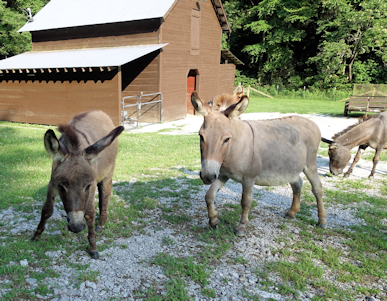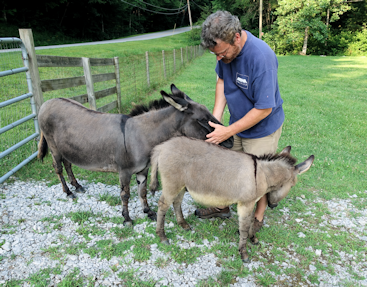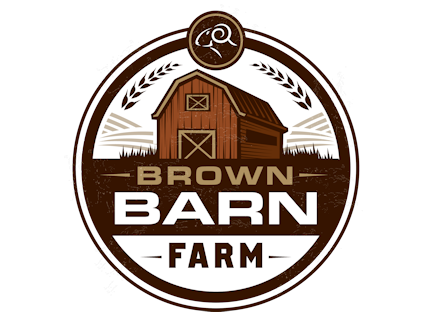History
The Miniature Donkey originated on the Mediterranean islands of Sicily and Sardinia. They have been used for over thousands of years to transport wheat and grain and to turn grinding stones.

Their milk has been used for a common remedy during the Roman era and has also been used as a substitute for mothers milk to orphaned children and non-lactating mothers due to its similarity of human milk for its lactose, proteins, minerals, and omega 6 & 9 fatty amino-acid content.
The first Mediterranean Donkeys were imported into the United States around 1929, when a group of seven was imported by Robert Green of New York. Green was a lifelong advocate, and said of them: “Miniature donkeys possess the affectionate nature of a Newfoundland, the resignation of a cow, the durability of a mule, the courage of a tiger, and an intellectual capability only slightly inferior to man’s.”
Characteristics
Miniature Donkeys weigh between 200 to 450 pounds. Their height limit at maturity (3 Years old) is between 26-36 inches at the withers which is the last hair of the mane at the bottom of the neck. The shorter donkeys fetch a higher premium.
The hair ranges from flat and curly to long and shaggy and in the texture from smooth to wiry. The hair coat is shed out much later in the summer than that of the horse and serves to protect the donkey from the weather and from the flies.
 The most common color for Miniature Donkeys is gray-dun which consists of a gray colored body with a dark color dorsal stripe down the back and over the shoulders. This dorsal stripe is known as the “donkey’s cross” said to have been imprinted on the donkey’s back as it stood at Christ’s crucifixion. Miniature donkeys also come in variations of black/brown, white, spotted and roans. Most of the donkeys will have darker markings on the ears, the tip of the tail and around the feet. Some have “Garters” or stripes ringing the legs as well.
The most common color for Miniature Donkeys is gray-dun which consists of a gray colored body with a dark color dorsal stripe down the back and over the shoulders. This dorsal stripe is known as the “donkey’s cross” said to have been imprinted on the donkey’s back as it stood at Christ’s crucifixion. Miniature donkeys also come in variations of black/brown, white, spotted and roans. Most of the donkeys will have darker markings on the ears, the tip of the tail and around the feet. Some have “Garters” or stripes ringing the legs as well.
Miniature Donkeys are one of the friendliest and most affectionate animals of the equine breeds. They are very tame and gentle. They are also easier to manage in everyday life than most donkeys due to their size. They love their owners and seek attention and affection like a dog. They are quite intelligent, curious, and very affectionate. They are very easy to train to pull a cart or carry a small child.
Donkeys are naturally aggressive to canines and this behavior will extend itself to their pasture mates. Donkeys are not purposefully protective of stock but are either reacting to a threat in their territory or behaving as a maternal jenny. Donkeys make acceptable guardians of sheep, goats and calves. Often the sheep or goats come to see the larger donkey as protective and will gather near it if they perceive a threat. Donkeys can protect against a single fox, coyote, roaming dog and possibly a bobcat.
Care
Unlike a livestock guard dog, a donkey will have similar maintenance and feeding requirements with its pasture mates.

They will need definitely need shelter from rain and snow. Do not give donkeys access to Rumensin, urea or other feeds and supplements only intended for ruminants. Donkeys also need trace mineral salt, not the white salt eaten by sheep or goat. Donkeys will also drink more water than sheep or goats.
Donkeys respect the same fencing as sheep, goats, or calves, although donkeys will chew on wooden fences or posts. Never leave a halter on your Donkeys due to the danger of hanging.
Donkeys are extremely long-lived, with a life span of thirty years or more. They are also relatively inexpensive, although experienced guard donkeys will cost more.
Fore more information about the Miniature Donkey: The National Miniature Donkey Association

Comments
Very informative article. I would like to get one but my apartment rules will not allow it.
Thanks Roberto,
Our goal is to educate and inspire.
I could see how your apartment management might frown on a miniature donkey.
Perhaps your living arrangements might change some day and you would have the opportunity to experience these guys. They act like big puppy dogs, especially when they are young.